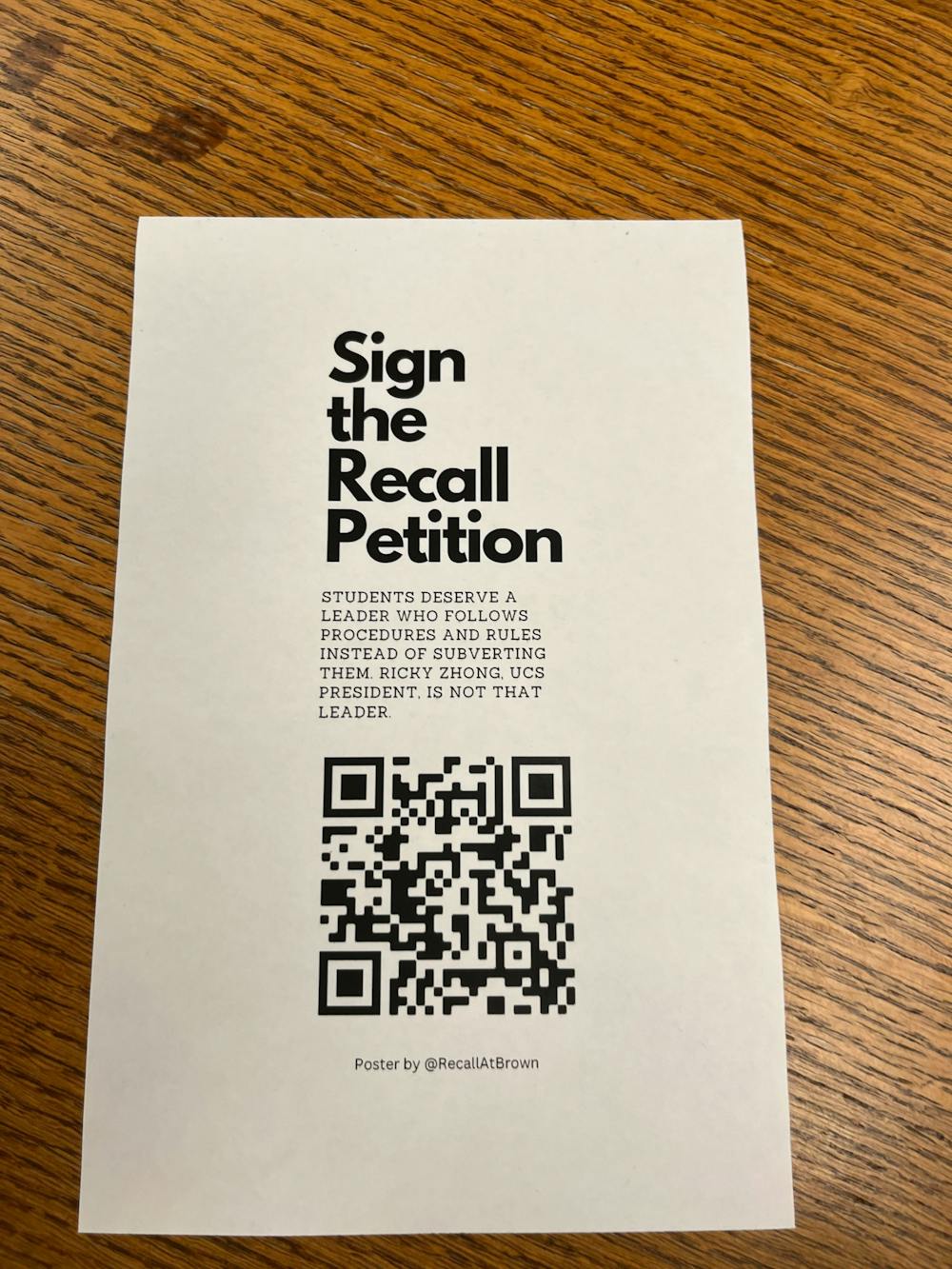A Sept. 30 petition called for a recall election of Undergraduate Council of Students President Ricky Zhong ’23 shortly after members of the UCS executive board expressed concerns about internal proceedings last week.
Members of UCS lamented changes made this semester to the council’s operation, including the elimination of the general body, failure to implement the Student Government Ethics and Accountability Board and possible violations of the UCS Constitution, The Herald previously reported.
The resolution motioning to hold a recall election is sponsored by Chris Vanderpool ’24, who was a UCS general body member for the past two years and is currently a member of the Equity and Inclusion Committee. Vanderpool, who criticized changes to UCS operation in a Herald op-ed, is also the student behind the new @recallatbrown Instagram account.
“According to Section III, Subsection 4.1 of the UCS Code of Operations, (if) any undergraduate at any time feels an Officer or Member of UCS is not upholding the duties of his or her position, he or she may initiate recall procedures,” the resolution reads.
The UCS Code of Operations specifies that 300 signatures are required to initiate a recall election. Vanderpool said that he received more than 100 signatures the weekend after he distributed the petition.
The resolution also states that Zhong “has acted outside the boundaries of their elected position … and has (violated) the UCS Code of Operations through actions including the dissolution of UCS general body, changes to its at-large body, keeping the UCS general body in the dark of changes occurring within the organization and the election to fill the vacancy of the UCS Chair of Campus of Life.”
Zhong said his initial reaction, other than surprise, was confusion. “There was nothing that was ever brought to us beforehand about these concerns,” Zhong told The Herald. He said he believed that Vanderpool had made public “something that should have been an internal conversation.”
Vanderpool explained that starting the recall petition was “a few weeks in the making.”
In the weeks preceding the petition, it became clear to Vanderpool that given the changes within UCS this year, especially the dissolution of the general body, there were very few options “available to students to have a voice in UCS … (other) than doing a recall,” he said.
He said that having a recall petition “is really the only way that … individuals who aren’t part of UCS or even that used to be part of UCS general body can really have a say in how this organization is going to shape and work out.”
He said that, through extensive conversations, he had solicited advice from current UCS e-board members, former UCS members and students who are not directly affiliated with UCS before publicizing the recall.
According to Vanderpool, student reactions to the recall have been a “mixed bag.” While some reacted “passionately in opposition” to what he’s doing, others offered their support by signing the petition after they learned what had happened, he said.
But Zhong said that most students “don’t care” to participate in this kind of movement.
“What they care about is that we get things done, that we are working on things that matter to students and, if anything, I think they want us to have less bureaucracy,” he said.
“From what I’ve heard, there hasn’t been a lot of traction or interest in the student body,” Zhong added. “Students don’t want to have to worry about (UCS bureaucracy) in the middle of the year. And I think they shouldn’t be.”
For some students, a recall carries little importance. “Caring about this election is just such a sign of flagrant privilege. … When you read through the reasons, … everything is just so bureaucratic,” said Lucy Lebowitz ’24, an undergraduate student who has never been involved with UCS. “For the average student, none of (the) UCS bureaucracy makes sense.”
Lebowitz added that throughout her time at the University, it has become clear to her that UCS doesn’t have much power in general. “The fact that (Zhong) can be abusing his power … to the point where he needs to be impeached is ridiculous to me, just because he doesn’t even really have any power,” she said.
Vanderpool said that he voiced his concerns about dissolving the general body to Zhong shortly after UCS’s Sept. 6 email announcing the transition into town halls, but Zhong’s response was that the “executive board is basically now the general body,” Vanderpool added.
Zhong said that members from every branch of student government — UCS, the Undergraduate Finance Board and the Class Coordinating Board — have voiced their support for him.
The general sentiment of student leaders seems supportive of the changes UCS has made, “especially because a lot of the changes that Chris Vanderpool criticizes are changes that we’ve made specifically to keep ourselves more in line with the (other branches) of student government,” Zhong said.
According to Zhong, even though the petition attacks the entirety of UCS, it only proposes to remove him.
“I’m more than happy to try to deal with it on my own, and if things escalate to the point where he gets 300 signatures, … then (UCS) will work as a team to take more direct action and communication with respect to (clearing things up) for the student body,” Zhong said.
“We do care about (Zhong’s) well-being as a person, (and) we do support him in the ways that we can as a board,” said Mina Sarmas ’24, UCS vice president.
Zhong said that the UCS e-board has “a lot of confidence in … the student body (and) our own efficacy. And I think that … we’re already doing a pretty incredible job this year.”
If the recall petition reaches the 300 signatures outlined in the UCS Code of Operations, it can be presented to the council. If the signatures are validated by the council, there will be a recall election within two weeks.
Zhong said that he expects the petition to garner the 300-signature minimum given the lack of time limit, but added that he does not think he will get impeached.
In the case of a recall election, “those (who) don’t care just won’t vote, and those who care know that … I am not some kind of evil dictator,” he said.
He added that UCS does not plan on making substantial changes to its semester plans.
“In the short term, my focus is going to be continuing to work on getting the (Student Government Ethics and Accountability Board) going, regardless of the outcome of this” petition, Vanderpool said.

Kathy Wang was the senior editor of community of The Brown Daily Herald's 134th Editorial Board. She previously covered student government and international student life as a University News editor. When she's not at The Herald, you can find her watching cooking videos or writing creative nonfiction.





